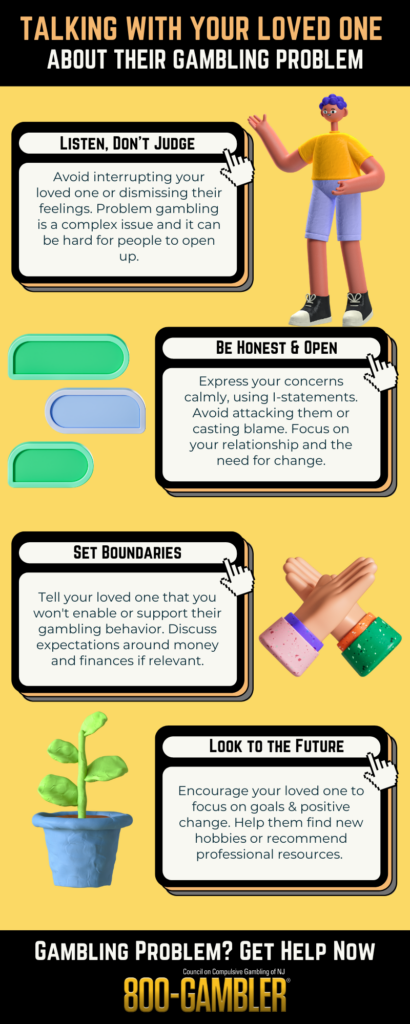Hearing that your loved one is dealing with a gambling problem can be a shock that comes out of the blue, the recurrence of a perpetual argument, or the confirmation of a long-held suspicion. Regardless of how the information is delivered to you, one thing is certain: it’s essential to handle this news in a way that supports you and helps your loved one move forward with treatment.
Here’s what you need to keep in mind while talking about your loved one’s gambling problem — whether it’s the first conversation you’ve had with them or an ongoing discussion.

Avoid Judgment
Dealing with a gambling disorder can be lonely, frightening, and overwhelming. Many problem gamblers hide their struggles from friends and family members out of shame, guilt, and denial, so when your loved one is brave enough to start a conversation, it’s essential to listen with patience, compassion, and understanding. If you find yourself feeling critical, judgmental, or angry, keep your thoughts in your head for now. Let your friend or family member speak uninterrupted about their thoughts and feelings, and let them know you are here to help.
It’s important to understand that recovery is not a linear process. It will sometimes take gamblers in recovery multiple attempts to stop gambling for good. In addition, sometimes problem gambling is a symptom of a deeper root cause, such as mental health problems like bipolar disorder and depression. If someone isn’t seeking professional help for these issues or remains undiagnosed, it may be much harder for them to quit using gambling as a coping mechanism. Combining traditional problem gambling solutions (such as support groups) with professional therapy (such as cognitive behavioral therapy) is often a better solution for people dealing with multiple struggles at once.
Be Honest & Open
Once you’ve heard what your loved one has to say, take time to express your own concerns, thoughts, and feelings. Be honest about how this news (or continuing behavior) affects your relationship with the person using I-statements. (“I think, I feel, I see,” rather than starting your sentences with “you.”) Problem gambling can be difficult to understand and can seriously fracture relationships. You have every right to express your true thoughts and feelings about the topic, but remember not to veer into accusation or frustration. Simply explain how the situation makes you feel and express that you are worried about them.
Set Boundaries
Setting boundaries is another essential communication strategy when supporting your loved one with a gambling problem. Let your loved one know you cannot enable them or continue supporting their behavior. To avoid arguments over money problems, set clear boundaries around money and finances, do not spend time gambling or talking about gambling with your loved one, and avoid providing any access to funds that they can use for gambling. If you share financial accounts, consider separating them or setting up a new account in your name only.
Throughout this process, don’t forget to seek help and support for yourself. This may include talking to a therapist or joining a support group for loved ones of those with gambling problems. Remember that you deserve to be treated with respect and care. It is not your responsibility to fix your loved one’s gambling problem on your own, nor is a gambling problem an excuse for your loved one to treat you poorly.
Look to the Future
No matter how hopeless the situation seems, problem gamblers can take back control over their lives — and looking forward to a brighter future is an invaluable part of supporting your loved one’s recovery. Let them know that recovery is possible and that you believe in their ability to overcome their problem. Encourage your loved one to focus on their goals and to make positive changes in their life. Help them identify healthy activities and hobbies they can engage in instead of gambling, or suggest a few ways to spend time together that they might enjoy. By focusing on the future and the potential for positive change, you can help your loved one see a path to recovery.
Call Us Anytime
If you or someone you love is developing a preoccupation with gambling, call our confidential toll-free hotline anytime at 800-GAMBLER, or check out Gamblers’ Anonymous meetings online and find help right from your phone or computer. We believe in you — make a positive change today!



